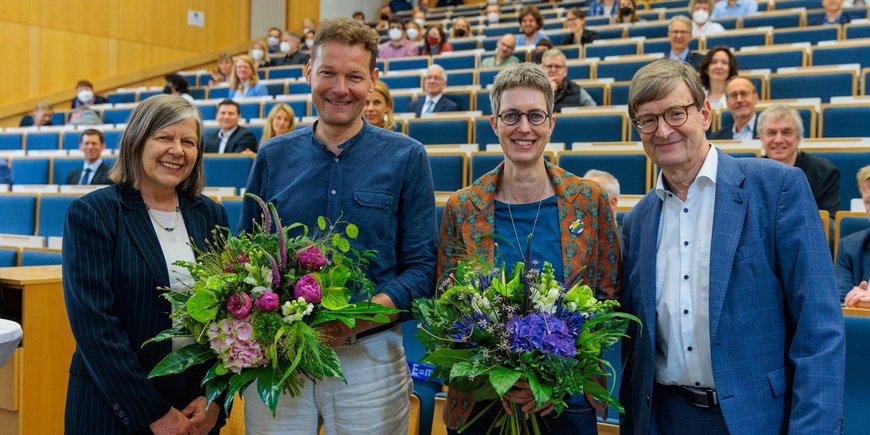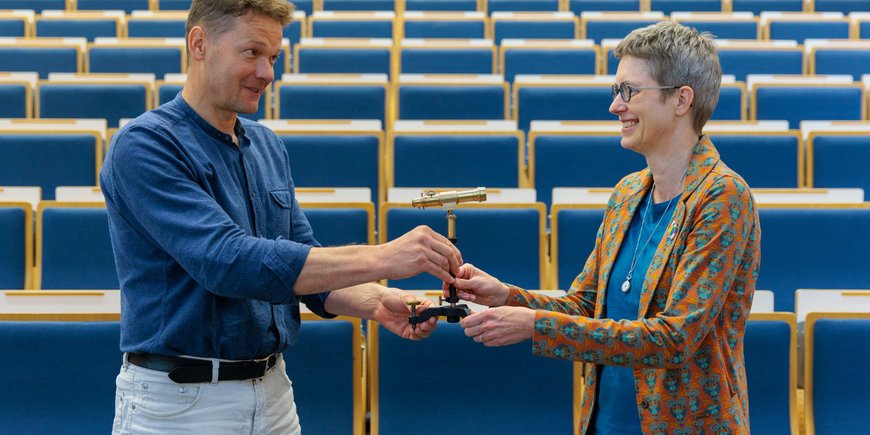On 09 June 2022, the ceremonial inauguration of the new GFZ Executive Director Susanne Buiter took place by the Chair of the GFZ Board of Trustees, Oda Keppler, Ministerial Director at the Federal Ministry of Education and Research, and Otmar Wiestler, President of the Helmholtz Association. In the presence of numerous guests of honour and GFZ staff, interim Executive Director Niels Hovius now officially handed over the reins to his successor Susanne Buiter.
On this occasion, he presented the new Executive Director with a "Visiscope", an optical instrument, suitable for both wide-angle vision and microscopic details, movable for a 360-degree all-round view, which helps to quickly identify problems and maintain the necessary flexibility, both in observing the solid Earth, its surface and the outer spheres, and the cosmos GFZ.
Beforehand, Susanne Buiter was once again officially welcomed as the new director of the GFZ.
Ministerialdirigentin Oda Keppler spoke both as Chair of the GFZ Board of Trustees and as a representative of the Federal Ministry of Education and Research and welcomed Susanne Buiter: "As an outstanding scientist and research manager, you are taking over an institute that is unique in the German research landscape and excellently positioned for the tasks of the coming years." In particular, she emphasised the important role of the GFZ in the context of research on climate change and its consequences, as well as in coping with the energy transition, but also in informing and advising politics, and highlighted its expertise with regard to earth observation, resources, storage and geohazards. "For the tasks ahead, I continue to wish you a good start and good success with the great team of the whole GFZ."
Keppler also thanked Niels Hovius for his interim work, which he had managed in difficult times with a clear view of priorities, open communication, a wealth of ideas and with heart and soul.
Helmholtz President Otmar Wiestler warmly welcomed Susanne Buiter to the Helmholtz Association: "As a geoscientist with a great reputation, you are an ideal person to lead the GFZ in the future phase that is now beginning. Not only with the expertise in your own discipline, but above all with your international experience and the view from outside, you bring a very important new perspective and important new impulses to Potsdam, and also to the Helmholtz Association. I wish you every success in the great tasks ahead and a lucky hand in the many important decisions, as well as joy and satisfaction in your work."
Wiestler pointed out that in view of current crises such as the one in Ukraine, we must not lose sight of climate change as probably the most striking and greatest challenge of our time. As an internationally recognised beacon in the geosciences, the GFZ plays a leading role with special responsibility in tackling this challenge, as well as in the further development of Potsdam as a top location for earth sciences and climate research. The centre's high attractiveness for numerous scientifically excellent, often young talents is also impressive in this regard.
Wiestler also thanked interim director Niels Hovius for his work over the past one and a half years, during which he had achieved enormous things for both the GFZ and the Helmholtz Association with great commitment and provided important impulses.
Susanne Buiter echoed the thanks to her predecessor, who had prepared an optimal transition for her. She then looked to the future, using selected images and examples from the entire breadth of GFZ research, which is embedded in the research of the Helmholtz Association and a large international network.
She referred to the first open dialogues that had already taken place with many colleagues. For example, she mentioned diversity and inclusivity, sustainability and open science as important themes that will guide her work at the Centre: "Diversity is important every day, because everyone should feel welcome at the GFZ and find conditions to do their work as well as they can." It is important to give young scientists in particular everything they need for a career, regardless of where they will be working in the future, including career advice, leadership training and support with applications.
For her, sustainability does not only include research that conserves resources: "I would like to initiate a process that leads to a long-term scientific strategy for the Centre that goes beyond the current research programme PoF IV (2019-2026)." This includes appropriate projects and infrastructures such as laboratories and satellite missions, but also space for flexibility to be able to react quickly to new challenges.
An important basis for this is basic research, which is very close to her heart and without which applied research would not be possible: "At the same time, we must also create enough room for chance discoveries, because chance - as the past has shown time and again - is an important factor in science."
The task of research also includes transferring knowledge and results to all areas of society. At the GFZ, this is already happening in many ways, from services for colleagues in science, to company spin-offs, to outreach activities such as the Long Night of Science and the school lab.
"Research needs the trust of society. In order to gain and maintain it, we have to explain - in the sense of "open science" - how and why we do research. Then a better understanding of our results will also emerge."
How the quality of research and its impact on society can be measured is one of many topics at the interface of research and society through which new links can be forged with the IASS: "We are delighted", Buiter said, "that the IASS will officially become part of the GFZ on 1 January 2023."
Susanne Buiter also emphasised in her speech that research is more than laboratories, computers, instruments and field work: "Without library and information services, without workshops, without purchasing and administration, science would not be possible. Each has a role and a contribution."
She concluded with an image of our planet: "Let's push the boundaries of our knowledge of the Earth together and with team spirit."









![[Translate to English:] Torsten Sachs in front of a climate station on a field](/fileadmin/_processed_/3/9/csm__TorstenSachs_bearbeitet_GS_4a1365ef84.jpeg)

![[Translate to English:] left image flood at the Ahrtal: image from above, several houses are flooded; left image:: Heidi Kreibich;](/fileadmin/_processed_/4/4/csm_Bild2_9af0130e9f.png)



![[Translate to English:] Start der Vega Rakete](/fileadmin/_processed_/6/4/csm_20231201-kachel_Vega-VV23-launch_ESA-CNES-Arianespace_706716b68c.jpeg)









![[Translate to English:] Poster exhibition at the Brandenburg Hydrogen Day at the GFZ, some participants in the foreground](/fileadmin/_processed_/6/5/csm_Erster_Brandenburgischer_Wasserstofftag_GFZ_402fcec95e.jpeg)
![[Translate to English:] Group picture of the participants](/fileadmin/_processed_/9/4/csm_20231108_CAWa-Workshop-Tashkent_Gruppenbild_99ea779d8a.jpeg)

![[Translate to English:] [Translate to English:] Hörsaal](/fileadmin/_processed_/e/6/csm_H%C3%B6rsal_e21ac645fb.jpeg)


![[Translate to English:] The Delegations in the Historic Library on the Telegrafenberg. In the back there are from left to right, the Dutch Ambassador for Germany, Ronald van Roeden, the Dutch Minister for Education, Culture and Science, Robbert Dijkgraaf and the scientific director of the GFZ, Susanne Buiter.](/fileadmin/_processed_/d/b/csm_Kachel-2_9eba4b4212.jpeg)

